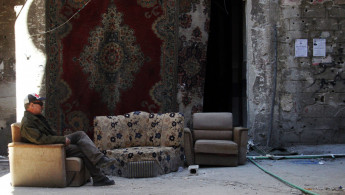Nusra Front and its alliances of convenience
Syrian opposition forces are attempting to break a siege of Yarmouk camp in Damascus, imposed by the Islamic State group (IS, formerly known as ISIS).
Armed rebel groups - Jaish al-Islam, Sham al-Islam Brigade and al-Ababil Brigade – have joined arms to stem the IS advance in Syria's largest Palestinian refugee camp that started on Wednesday.
War in the camp
The counteroffensive has been dubbed by the various rebel factions as "victory for the people of the camp".
Fighting has been heaviest in the south of the camp, with battles breaking out between opposition groups, IS, and the Nusra Front.
Meanwhile, the north remains relatively quiet where the Palestinian militia Aknaf Beit al-Maqdis and IS face off.
The intense fighting has worsened conditions in a camp that had already been ravished by the Syrian regime's two-year siege leading to the breakout of diseases such as polio, and mass starvation.
But questions remain about Nusra's role in the IS attack on the camp.
Activists say the al-Qaeda affiliate in Syria allowed IS into Yarmouk. A statement released by the group denied any support for IS, reiterating its "neutrality" in the conflict.
Nusra and IS have fought each other in different parts of Syria.
Analysts say that one consideration for the neutral parties in Yarmouk - such as Nusra and Ahrar al-Sham - is that they are wary about being drawn into the war as it would weaken their defensive lines with the Syrian regime
These fears came true when Beit al-Maqdis sent fighters to engage IS militants, and the regime exploited the situation attacking the Palestinian group from the rear.
Nusra has lost control of parts of Damascus it once controlled, and its presence in the city is limited to Yarmouk. It has been accused of buying time to see who will win the battle in the camp.
Others say the group has returned to allying with rebel groups that share its extremist ideology.
Opportunist alliances
Nusra has a history of forming alliances driven by strategic motives.
It watches intracide battles among the opposition from the sidelines before allying with the winner. This is part of its so-called "battle doctrine".
This happened in al-Qalmoun when Nusra allied with IS against Hizballah, yet fought the group elsewhere in the country.
The situation in Yarmouk supports this idea.
Yet across the country there appears to be a divergence in strategies, policies, and alliances among Nusra militias in the country.
Some have pinpointed two strands within the organisation.
After the Nusra leadership declared their neutrality in the Yarmouk conflict, one former commander in Deir al-Zour announced his opposition.
"If I were in the camp, I would only stay if it was purged of IS," said Abu Maria al-Qahtani.
"I am speaking from what I think of the group religiously. I am not taking sides with Nusra or any other group. I am saying the truth."
Later comments suggest that Qahtani was calling on Nusra to take on IS nationwide.
His experiences in Deir al-Zour might have shaped his opinions of IS and the Nusra leadership.
When IS appeared to be on the brink of wresting Syria's eastern city of Raqqa from Nusra's control, calls for reinforcements were ignored by the group's leadership.
But the Nusra commander also said there was an element of double standards from militants in the camp who have criticised Nusra's alleged role in giving IS free passage into Yarmouk.
He said that the al-Qaeda affiliate had been engaged in a conflict with Yarmouk Martyrs Brigade, who has pledged allegiance to IS. Some rebel groups, critical of Nusra's suspected alliance with IS in Yarmouk, supported the brigade in the battle.
What can be clearly said is that Nusra's strategy seems to change with each battle.
Their leadership appear to be driven by forming alliances with other rebel groups when it suits them and dropping them when it is convenient.
This is probably why there are so few rebel groups left in Syria that trust al-Nusra.
This article is an edited translation from our Arabic edition.



